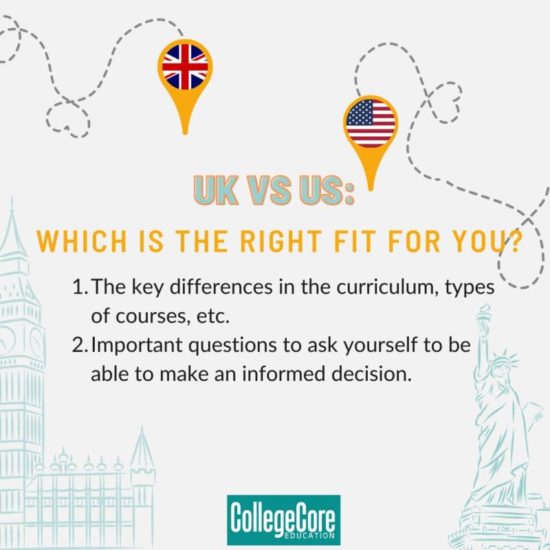
Five Key Differences between US and UK Universities:
1. Application Process– The US education system lays emphasis on extracurriculars and standardized test scores such as the SAT or the ACT, whereas, UK universities prioritize academic performance and subject-specific tests such as UKCAT or BMAT. Moreover, students applying to the US need to submit additional documents such as letters of recommendation, transcripts, and university-specific essays, while those applying to the UK may apply to up to 5 universities with a single application through the Universities and Colleges Admissions Service portal (UCAS).
2. Course Duration- A typical UK university degree takes three years to complete with the academic year divided into 2 to 4 terms and following a trimester or quarterly system while it is 4 years in the US with the academic year divided into two semesters: the fall and the spring. Some universities also offer a summer semester in addition to the fall and spring semesters.
3. Course Structure- US universities do not require students to declare their major till the second year, and pay large emphasis on wider-ranging education, and soft skills like interpersonal communication, critical thinking, etc., that support a variety of career paths. Thus, the course structure is based on homework assignments, group projects, quizzes, tests, and class participation.
UK universities, on the other hand, require students to declare their major before applying and focus more on giving an in-depth understanding of the chosen subject matter through traditional lecture-based classes. Thus, they emphasize term-long reading over non-related electives and class assignments.
4. Fee Structure- Tuition at US Private universities is nearly $34,740 per year, while public universities charge nearly $25,620 annually for international students. In contrast, the UK follows a standardized fee structure set by the government. The average tuition at UK’s Public universities is around £22,000 per year for international students and has a maximum limit of £26,000 that can be charged for most undergraduate courses.
5. After Graduation- After graduating from a US university, students can stay for up to 12 months and work in the US ( STEM students get an extension of 24 months). However, they are required to secure a job within the first three months after completing their degree. The UK, however, allows international students to stay back and work for not more than two years, irrespective of their field, job, or salary.
Key Questions to ask yourself before deciding:
1. Which country’s university aligns better with my academic strengths and offers better opportunities to achieve my long-term career goals?
2. Which educational experience appeals more to me: an independent learning environment or a more structured academic one?
3. Which country’s universities offer more affordable options for my budget?
4. Which country’s universities offer an environment that aligns better with my values and preferences?
If this article answers your queries, check our website –www.Collegecore.com.
For assistance related to Undergraduate college applications and admissions,
please book an appointment with Ms. Urvashi Malik, Founder-
CollegeCoreEducation.